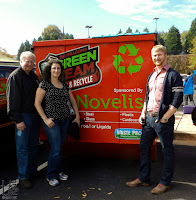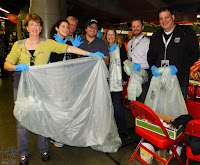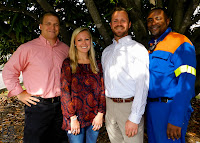The Georgia Dome (Dome) - home to the Atlanta Falcons - is exploring avenues to refine their impressive recycling practices to new dimensions. As a Founding Zero Waste Zones (ZWZ) Participant, the Dome built a strong recycling foundation when the ZWZ launched in February 2009. The ZWA Blog article, Refining Recycling Practices at the GA Dome, gives an overview of the Dome's recycling history and future commitments.
 |
Ei team @ Novelis recycling
dumpster in tail gate lots |
In spring 2012, the Dome accepted the invitation to serve as the SFCI Event Pilot. Along with the Georgia World Congress Center – fourth largest conference center in the nation – and 20-acre Olympic Centennial Park, the Georgia Dome is one of three facilities under the state-owned Georgia World Congress Center Authority. Tim Trefzer - GWCCA director of sustainability - oversees the impressive sustainability accomplishments, including zero waste and well beyond, for the three facilities.
The SFCI - Dome announces the following 2014 Falcons season goals:
- Implement a post-consumer food waste collection program
- Source-separate material generated for on-site produced mini-bales
- Expand game day tailgate recycling initiatives in the GWCC-owned parking lots; explore recycling possibilities at privately held parking lots.
Establishing baselines | fact finding for the business model development are the first action steps and timing is impeccable with the August pre-season Falcons home games.
 |
Nov 10 SFCI-dome team
"picking the bowl" |
Fact finding for the post-consumer food waste collection program began on November 10, 2013 when the SFCI Team "picked the bowl" post-game for food waste and compostable items. The team collected approximately 130 pounds of compostable material in 13 bags, which were delivered to a permitted commercial composting facility by SFCI co-chair Doug Kunnemann of NatureWorks and Elemental Impact founder Holly Elmore. Great news: the material placed at the end of a windrow composted well!
The Refining Recycling article referenced above includes details on the November 10 game activities.
Continuing the fact finding that began in November, the SMAT - Sustainable Materials ACTION Team - attended the August 8 Falcons pre-season game. With the November game findings grounded in collecting compostable items, the August game mission was focused on identifying contaminants in the food & beverage packaging served at the Dome.
Note the intention is to pilot post-consumer food waste collection on the Club Level for the 2014 season while taking the program to the entire stadium in the 2015 season.
Several seasons ago, Dome concessionaire Levy Restaurants embarked on sustainability practices that laid a solid foundation for the post-consumer food waste collection program. In general condiments are served at pump stations, eliminating the common packet contamination. The Dome suites foodservice uses reusable plates, flatware, napkins, serving platters and beverage cups & glasses and concessions serve food & beverage items in compostable packaging, with a few exceptions.
 |
| SMAT post-game @ Dome |
Under the direction of SMAT chair Sarah Martell of Innovia Films, team members Rick Lombardo of Natur-Tec, Wendell Simonson of Eco-Products and Grant Braasch of NatureWorks toured the Club Level concessionaire operations scouting for contaminants.
Once the team reconvenes for a recap meeting, Sarah will draft a report for Tim, Holly and Doug. An outstanding item is to determine if pre-season concession service mirrors season service. An anticipated challenge is packaging used by Levy's sub-contractors at games. At the November game, the team found specialty nuts, cotton candy, chips | peanuts and yogurt containers are the main contaminants when picking the Dome general seating for compostable items.
In addition to post-consumer food waste, the pre-season Falcons games are the platform for the on-site source-separated material model business case. In a nutshell, the model consists of moderate generators using mini-balers to source-separate material into bales, which are delivered to a recycling center. Once weighed and tracked by participant, the mini-bales are aggregated by material into standard mill-size bales. The recycling center stores the bales until ready for sale by the tractor trailer load. Revenue is distributed to participants in proportion to material generated.
 |
GWCC values their cardboard & has
an excellent recycling system |
Financial success is grounded in two equally important components: 1> volume and 2> clean material, free of contaminants. For volume, the intent is to recruit Atlanta's zero waste pioneers to once again step into a leadership role. One of the underlying mottos in original ZWZ recruitment was "maximum volume, minimum decision makers." Program participants are required to provide CLEAN material - the tagline is Contamination is a Mistake!
Challenge: no infrastructure exists in Atlanta or most cities to handle mini-bales. Yet mini-balers are essential due to the moderate quantity of material generated. A Dome pilot goal is to substantiate the model improves the bottom line after considering baler cost and increased labor necessary for on-site separation. The model is an prime example of Ei's concept Recycling Integrity - maintaining maximum material value with minimal energy expended.
Creating infrastructure requires aggregating a team of industry pioneers within the entire value chain willing to step beyond "the way it is done" and create new operating practices. The following are the pioneers who stepped forward as industry leaders:
Lead Pioneers:
- FreshPoint - nation's largest produce distributor
- GWCC | GA Dome - nation's fourth largest conference center | home to the Atlanta Falcons
- Georgia Institute of Technology (strong interest with
no formal commitment)
Infrastructure:
End Markets:
- Hilex Poly – world’s largest plastic bag manufacturer
- Novelis – world’s largest aluminum manufacturer with a
recycling plant in Greensboro, GA
- Pratt Industries – world's largest manufacturer of cardboard boxes from
100% recycled content with a mill in Conyers, GA
... and then Tim gave the big YES for the GWCC participating in the plastic film recycling template via the SFCI - Dome. Immediately, the template expanded from plastic film to include common recycling materials generated at event facilities: PET, aluminum and mixed paper.
To build the baseline, Tim requested a waste and recycling audit after the August 8 pre-season game by the Dome waste and recycling contractor. Although easy to determine the material generated via purchasing documents, the quantity of material separated for recycling versus sent directly to the landfill is necessary for the baseline. Understanding the contamination within the current recycling practices is another baseline component.
 |
David, Tim & Louis in
Dome loading dock |
While the SMAT team scouted the Club Level, Tim, Holly along with Louis Herrera and David Bangs of Hilex Poly visited the loading dock to check out existing recycling practices and examine the potential mini-baler site. Once the GWCCA recycling specialist is hired, recycling rates will immediately increase when an experienced person takes ownership of material generated at the three GWCCA properties. The new position is timed impeccably with the source-separated materials recycling pilot launch.
In true team spirit, Roderick Jackson with UNICOR | Atlanta Penitentiary joined the Ei folks at the August 8 game. Roderick must understand how material is generated, baled and transported to the Atlanta Penitentiary to create the most effective recycling center procedures.
 |
Orwak baler scheduled
for Dome delivery |
Next steps are delivery of a trial Orwak two-compartment baler for the Dome pilot in time for the August 23 pre-season game. While the prime August 8 game focus was post-consumer food waste, the August 23 game is source-separated material oriented. Ei Partners Novelis - the Falcons recycling partner - along with M-PASS and Pratt plan to attend the game.
A primary August 23 game goal is to bale enough aluminum and mixed paper for UNICOR to make two to three standard mill size bales. In addition, it is important to calculate the time required to sort mixed material bags and make a mini-bale for labor estimates within the business case.
Once the baseline and fact finding are complete, it is time for the template vision to get a reality check via a solid business plan. When the financials indicate the model promises bottom line rewards, the team will reconvene to chart the action course to refine the Dome's recycling practices, including post-consumer food waste, on-site material source separation and tailgate recycling.
The Ei Team is living the tagline, Sustainability in ACTION, at the Dome!
























